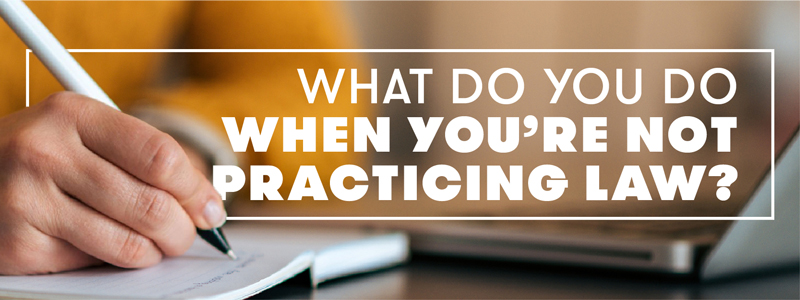
Working in the legal profession tends to be all-consuming. During a typical day, you could be urgently working on a brief that needs to be filed, reviewing discovery, prepping clients for a deposition, taking or defending depositions, or answering one of your client’s many (many) “must-know-now” legal questions. Taking a step away to disconnect from work can sometimes take a back seat.
When constantly swamped with work, finding “me-time” may be the last thing on your mind, let alone how to fit that time into your day. I find that when I feel I am too busy to take a break, that is precisely when I need to take one. Stepping away can bring much-needed clarity to the tasks at hand. Often, after I take a break, new ways of approaching a situation comes to mind, maybe a new argument for a brief or strategy for a deposition—all because I took time to clear my thoughts. When I need to disconnect from work, my go-to activities are playing the piano or writing poems and children’s books.
I find that when I feel I am too busy to take a break, that is precisely when I need to take one.
My introduction to poetry was when I took a creative writing class in high school. I will never forget the first poem I had to memorize and recite to the class: “The Arrow and the Song” by Henry Wadsworth Longfellow. For reasons unknown to me, I fell in love with poetry. I started writing poems between (and during) classes, on weekends, and over the summer. That was the stepping stone to writing my first play and, many years later, my first published children’s book.
Once I started law school, poetry, unfortunately, took a backseat. I focused all my efforts on keeping up with the readings and trying to decipher just what the heck I was supposed to be getting out of a case (which, I am sure we can all agree, was very hard as a 1L and felt more like learning a foreign language). One day after class, as I was on a walk trying to wrap my brain about a concept I was learning in Civil Procedure, I heard some birds singing in the distance, and my brain went into autopilot, stringing words together in a poem about the birds. When I arrived back home, not only did I find clarity on that concept I had been struggling with, but when I started writing a paper on that concept, I tapped into my creative writing side. I find that when I tap into my creative writing side, my writing becomes more precise and more compelling. Whenever I need to write a fact section for a memorandum, I tap into that same creative writing side and find that I can illustrate the facts in a more compelling light than when I would try to write the facts purely in a legal writing sense.
I also escape by playing the piano. Early on, I discovered that if I encountered a roadblock in my learning process (whether it be an exceptionally difficult science question I needed to resolve or an essay that I would be struggling to write), if I sat down and played the piano, I was able to resolve the roadblock. When I play, my soul relaxes, I get lost in the music, my mind clears, and somehow, without fail, I find myself with a fresh perspective and newfound clarity to tackle the roadblock head-on.
I can take a quick piano break during the traditional workday hours, clear my mind, and in the process, resolve a client issue that had been weighing heavy on my mind in a matter of minutes.
While everyone can agree that COVID-19 certainly has had its downsides, I have found that a surprising benefit (glass half-full, if you will) has been the ability to work from home. When I am working at home, I can take a quick piano break during the traditional workday hours, clear my mind, and in the process, resolve a client issue that had been weighing heavy on my mind in a matter of minutes. In contrast, when working in the office, I sometimes would have to “table” that client issue in my mind and wait until I got home from the office later that night to play the piano and achieve that same clarity.
In our field, it can sometimes become difficult to “turn your brain off,” so to speak, and not think about the client issues you are working on. What both creative writing and piano playing have in common for me is that they allow my brain to turn off work and retreat unequivocally into the moment. By doing so, I find a fresh perspective and newfound clarity to those same legal issues.
 By Rachel Zaiger
By Rachel Zaiger
rzaiger@dadygardner.com
Rachel D. Zaiger is an associate at Dady & Gardner, where she represents franchisees, dealers, and distributors throughout the United States in their relationships with franchisors, manufacturers, and suppliers.